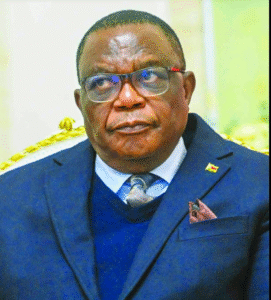MNANGAGWA’S MILITARY GAMBIT: SIBANDA’S POLITBURO APPOINTMENT RAISES CONSTITUTIONAL ALARM
In a move that has rocked Zimbabwe’s political foundation, President Emmerson Mnangagwa has appointed the commander of the Zimbabwe Defence Forces, General Phillip Valerio Sibanda, to ZANU PF’s powerful politburo as an ex-officio member. Known during the liberation struggle as “Cde Gwenzi,” Sibanda’s elevation into overt party politics is being widely interpreted as a radical and constitutionally questionable step — one that further exposes the regime’s growing dependence on military influence to secure political control.
The announcement, made at the ZANU PF annual conference in Gweru, came without warning. While delivering his speech, Mnangagwa outlined adjustments to the party’s leadership structure, noting the death of Cde Joshua Teke Malinga, and replacing him with Cde Rose Mpofu as Secretary for People with Disabilities. Then came the real bombshell: General Sibanda, still the sitting commander of Zimbabwe’s defence forces, was introduced as an ex-officio member of the politburo — ZANU PF’s central policy-making body.
This appointment, while politically symbolic, is legally and ethically murky. Section 211 of the Zimbabwean Constitution is unequivocal: “The Defence Forces must respect the fundamental rights and freedoms of all persons and be non-partisan, national in character, patriotic, professional, and subordinate to the civilian authority as established by this Constitution.” Sibanda’s inclusion in a partisan political body while still commanding the armed forces is a direct contradiction of this clause. It challenges the very essence of constitutional democracy and the principle of separating military functions from partisan politics.
Analysts argue this is more than just a symbolic appointment — it’s a strategic one. Mnangagwa’s move appears to be a deliberate act of “coup-proofing” his administration by rewarding loyal military elites and consolidating power through the security sector. This development follows the recent elevation of Lieutenant-General Anselem Sanyatwe, another key player in the 2017 coup, to the helm of the Zimbabwe National Army. Sanyatwe is widely viewed as Vice-President Constantino Chiwenga’s trusted lieutenant — and Mnangagwa reportedly distrusts him. Against this backdrop, Mnangagwa’s alignment with Sibanda, a more reserved but crucial military actor, sends a clear political message: he is shoring up his flanks and preparing for potential succession battles or threats from within.
The growing footprint of the military within ZANU PF and the wider state apparatus is not unprecedented. The 2017 coup, which ousted Robert Mugabe, laid the foundation for a new political order shaped by the military. However, this latest move represents a bold escalation — the military no longer just influences politics from the shadows but is now being formally inducted into the core decision-making structures of the ruling party.
This blurring of civil-military lines has grave implications. It sets a dangerous precedent that undermines constitutionalism, weakens democratic institutions, and threatens to transform Zimbabwe into a de facto military-state hybrid. The independence of the army is not just a legal requirement but a safeguard for democratic stability. Once that firewall collapses, civilian oversight becomes a formality and power becomes increasingly concentrated in the hands of a few who command the means of coercion.
Civil society, opposition parties, and constitutional watchdogs must respond swiftly and assertively. Silence or complicity in the face of such a transgression will only embolden further authoritarian entrenchment. The international community — particularly regional bodies like SADC and the African Union — must also weigh in, given the broader implications this has for governance and stability in Southern Africa.
Zimbabwe’s past is replete with painful lessons about the perils of unchecked executive power and the dangers of politicising the military. Mnangagwa, a product of that history, appears to be repeating it with alarming precision. By appointing a serving general to a partisan political body, he is not just breaching constitutional boundaries — he is signalling the militarisation of Zimbabwe’s future.
The consequences of this manoeuvre are profound and far-reaching. Zimbabweans must now ask: is this the consolidation of a party, or the quiet crafting of a junta? The line is becoming increasingly difficult to discern.



